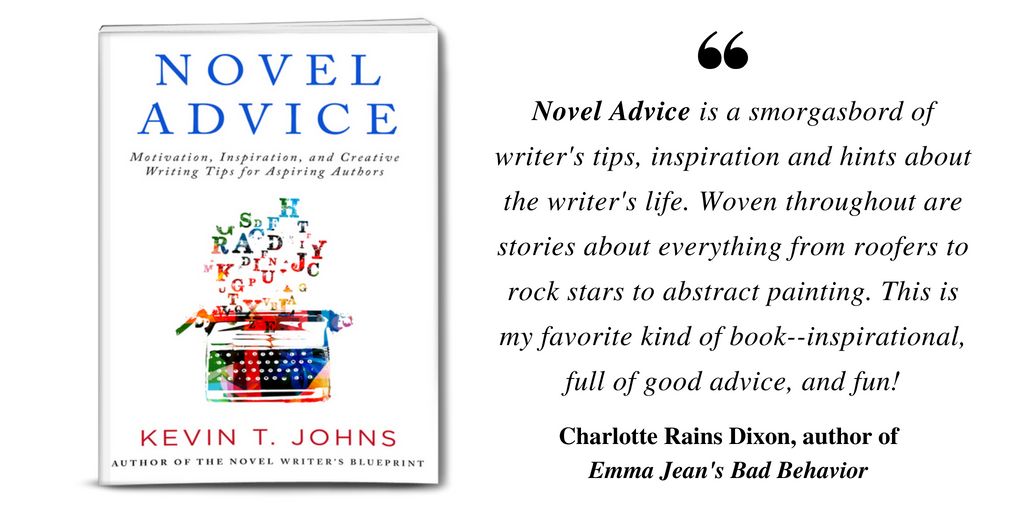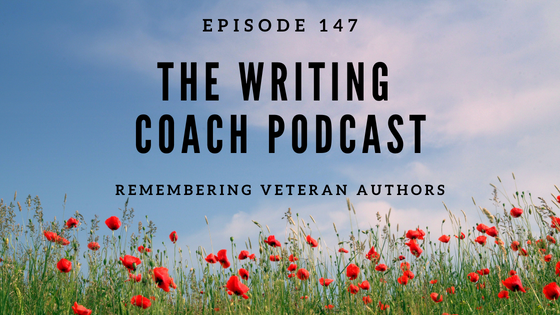What do Ernest Hemingway, J.R.R. Tolkien, and Roald Dahl all have in common?
They are veterans.
It’s Remembrance Day here in Canada and Veteran’s Day in America, so in today’s episode of The Writing Coach podcast, we cover many veteran authors and discuss how their experiences in war may have impacted their fiction.
Listen to the episode or read the transcript below:
The Writing Coach Episode #147 Show Notes
Get Kevin’s FREE book: NOVEL ADVICE: MOTIVATION, INSPIRATION, AND CREATIVE WRITING TIPS FOR ASPIRING AUTHORS.

The Writing Coach Episode #147 Transcript
Hello, but loved listeners and welcome back to The Writing Coach podcast. It is your host as always, writing coach Kevin T. Johns.
I am recording and releasing this episode on Friday, November 11th, 2022, here in Canada. Where I am located today is Remembrance Day, the day when we remember our veterans and our soldiers both who we lost and war, and who have survived and who are still fighting today in America. It is Veteran’s Day, I believe it’s called. And so regardless of where you are in North America today, hopefully, war and violence and the bravery of soldiers and the mindlessness horror of war and all of these things, the sacrifices made are on your mind.
My grandfather was a veteran in World War II on my father’s side, on my mother’s side my grandfather also a veteran, and my grandparents on that side had to escape Estonia following World War II when it was taken over by Russia. So certainly World War II impacted my family. I probably wouldn’t exist here in Canada if the events of the 20th century hadn’t taken place.
So many of us, of course, have veterans in our families or have been touched by war in some manner. I think all of us have to some extent. And so on the topic of writing in veterans in War today, I thought about what writers do I love and what are those great 20th-century authors and artists who weren’t just these creative thinkers and literary geniuses, but who were also veterans of war, men who fought in war either World War I, World War II, or some other wars that were going touch on today. And so I just thought it would be interesting on Remembrance Day to go back over some of the key writers of the 20th century and look at what role they played as soldiers and how that might have influenced their work.
First off, Ernest Hemingway. Hemingway was an ambulance driver in Italy in World War I, and I think one of Hemingway’s real masterpieces is A Farewell to Arms, which is a war book. The arms in A Farewell to Arms being the weapons of war. And I think in that book, if I recall correctly, I think there’s even a sequence where the protagonist is driving an ambulance during a battle very similar to Hemingway. So certainly his experiences as a soldier play in World War. I played into his writing and particularly into A Farewell to Arms which I think is a wonderful masterpiece of both war, but also romance and also tragedy. So that amazing book that came out of his experiences in World War I.
C.S. Lewis served in trench warfare in the Somme Valley. So when we look at books like The Lion, The Witch and the Wardrobe, and Prince Caspian and The Last Battle, these are all Narnia books by Lewis that feature war, that feature battle. And I think knowing that Lewis was a veteran of real warfare might alter the way you look at some of the storytelling in those Narnia books. And maybe it’s not necessarily all as magical or as whimsical as you might think, and that some of it might be drawn from Lewis’s own experiences in war.
Lewis’s colleague, friend J.R.R. Tolkin also fought in the Somme Valley. The same battle that Lewis fought in. Tolkin was also in the battle of the Upperville Ridge and the assault on Schwab and Ridout, of course, The Lord of the Rings is largely a war book. We’ve got tons of big battle sequences in that book. Something else though that I suspect Tolkin took from his experiences in war and applied to the Lord of the Rings is the idea of fellowship among men of arms, the idea of soldiers coming together and forming kinship and friendship through adversity and through life and death situations.
I think when I think about The Lord of the Rings, I don’t necessarily think about the big battles. I think about the relationships between all the different characters and how across cultures and races of middle Earth, the way the battle against evil brings them all together. And I suspect Tolkin was drawing upon that.
Long before George Orwell wrote 1984 or Animal Farm, the books he’s most known for, he wrote a memoir called Homage to Catalonia, and that covers his time serving and being wounded in the Spanish Civil War. And so this guy who we looked to as a great political writer was also a soldier and was perhaps building his political thought in his later books like 1984 and Animal Farm on his experiences in with War and Politics in the Spanish Civil War.
Isaac Asimov, the great science fiction writer really interestingly worked in the Philadelphia Navy Yard in World War II in a naval air experimentation station, and so is Asimov’s great science fiction mind was working on naval experimentation during World War II, so that seems startlingly appropriate.
Perhaps more surprising is Roald Dahl, the author of Charlie and the Chocolate Factory. He was a flying ace in World War II.
Arthur C. Clark, the author of 2001: A Space Odyssey, and who worked with Stanley Krick on the script for the famous cubic film of the same name, was in the Royal Air Force in World War II.
William Golding, who’s someone we talked about last week when we were talking about short books and his great book, Lord of the Flies, participated in the Normandy invasion on D-Day. He in fact, was commanding a landing ship, one of those ships you see in saving private Ryans opening sequence, the ship’s landing men upon shore and firing upon shore. He was commanding a ship that fired rockets onto the beach. In covering the men’s storming Normandy on Dday.
Dashiel Hammet worked for Army Intelligence before going on to write all the seminal noir detective fiction books that he is so famous for.
Robert Heinlein served in the US Navy. There’s another one of our science fiction authors in here. And of course, Highland went on to write Stranger in a Strange Land and Starship Troopers. Starship Troopers, the book being very different from the film, the film being satire, but clearly a book about space soldiers was likely drawing from Hyland’s experiences as a veteran.
I think probably the funniest book I have ever read would be Joseph Heller’s, Catch 22. It’s a Satire of War, Incredibly funny satire but Heller served in the 12th Air Force in World War II. And so again, Heller was drawing from real life experiences as a veteran, as a man who’d been to war when writing his great war satire, Catch 22.
While I was doing my research for this podcast, this one was a surprise to me. I don’t think I knew this, but another sci-fi author, Frank Herbert, the author of Dune served in the US Navy during World War II. I knew he was a big environmentalist, but I don’t think I was familiar with his service background.
Another author that we touched on last week is J.D. Salinger. Salinger was active on Utah Beach on D-Day, as well as active in the Battle of the Bulge. And he came back from World War II to go on to write all those wonderful pieces published in the New Yorker and The Catcher and the Rye, of course, the well-known book. And I don’t think a lot of people necessarily think of Saligner as a veteran either when they’re thinking about his work.
Someone who probably is more associated with his time in war is Kurt Vonnegut. Yet another one of my favorites who we touched base on our discussion on short books last week. Kurt Vonnegut was a veteran of World War II. He served in the Battle of the Bulge like JD Salinger. He also survived the bombing of Dresden. And if you’ve ever read Slaughterhouse Five that the bombing of Dresden was really the basis and in inspiration for that book, Slaughterhouse Five.
So I don’t know what my takeaway from this is, necessarily. Certainly, I don’t think writers need to go to war to write masterpieces. I think in the 20th century, a lot of men went to war, whether it was in World War I or World War II, and some of them went on to become incredible authors in write masterpieces like Slaughterhouse Five and Catch 22 and The Catcher and The Rye and Lord of the Rings and A Farewell to Arms and The Line, The Witch and the Wardrobe, and Charlie and the Chocolate Factor, and all of these books that we we’ve talked about here. But all I can think really is how many incredible books were lost when we look at the millions of lives lost in war over the last century in century and a half.
It’s devastating.
It’s devastating to think of the books that will never be written, the lives that were lost, the horrors of war. And so it’s November 11th, it is Remembrance Day. I hope you’re thinking a little bit about soldiers and about veterans and about war and the myriad of issues and complications and issues that brings up for all of us. It’s not simple. Surviving in this world is not simple. Knowing what evil to stand up to is not simple. Knowing when the sacrifice of life is worth it is not simple. And so I just wanted to take some time today on Remember Day, to think about writing, think about authors and to think about war. I hope you found this episode interesting, and insightful, and that you learned a little bit maybe about hope. Maybe there’s some surprises in here about authors who you didn’t necessarily know had been to war and who came home to write wonderful novels.
All right. That is it for this episode. Don’t forget to hit subscribe. And if you are looking for a free book, hey, head on over to my website, www.kevintjohns.com. I have a free book there called Novel Advice: Motivation, Inspiration, and Creative Writing Tips for Aspiring Authors. If you click on the link at the top of the page that says “Free Book,” you can get to a page where you can drop your email address into the form, get on my mailing list and get a free copy of that book.
Thank you so much for listening, and I will see you on the next episode of The Writing Coach.
Podcast: Play in new window | Download
Subscribe: Apple Podcasts | RSS

